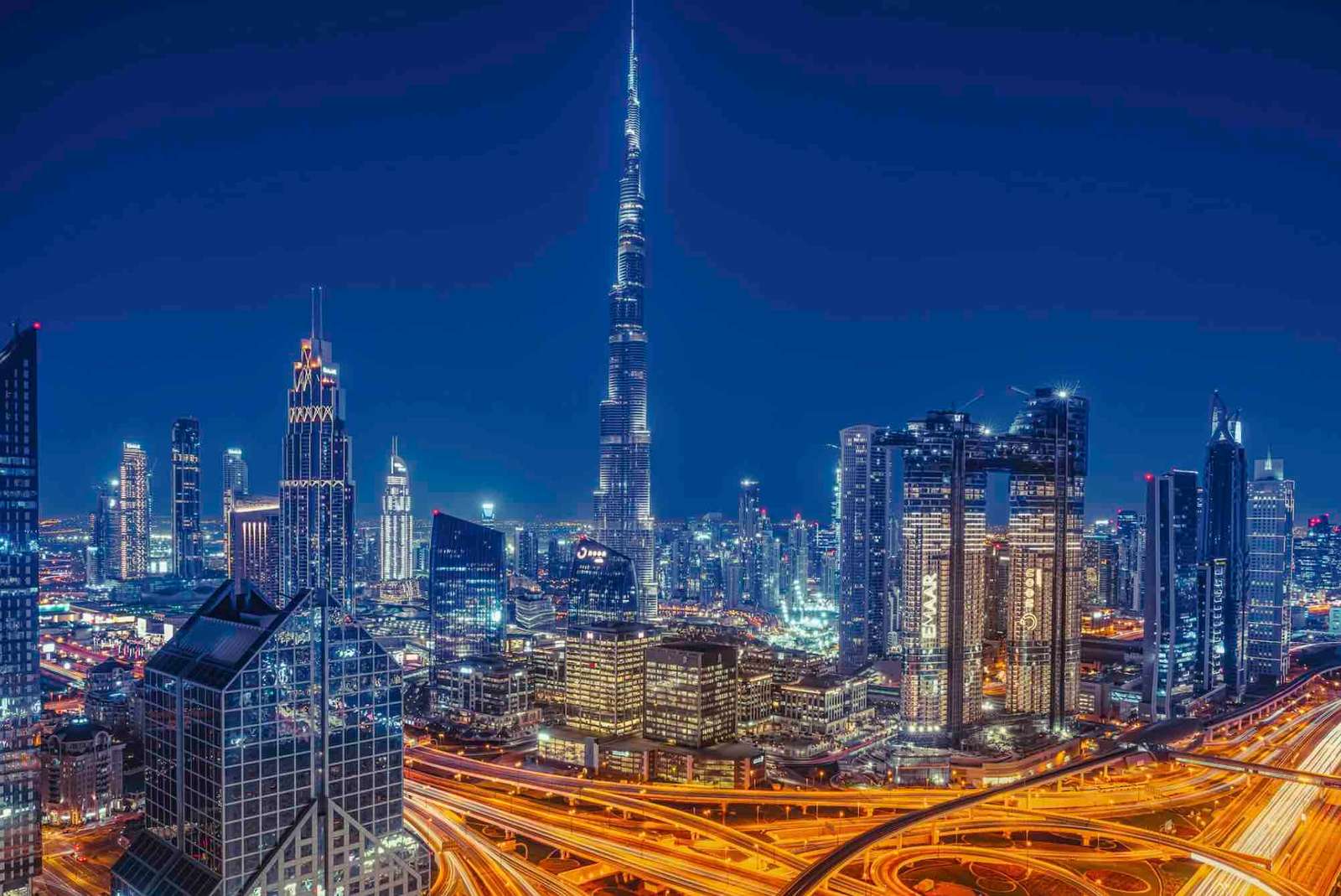The United Arab Emirates (UAE) was created in 1971 by combining seven emirates: Abu Dhabi, Sharjah, Ajman, Umm Al Quwain, Ras Al Khaimah, Fujairah, and Dubai. The country is well known for being a destination for luxury living.
The UAE used its substantial oil wealth to stimulate investments in various sectors after the end of the British Mandate. These “petrodollars” greatly aided growth and development in infrastructure, finance, tourism, manufacturing, and trade.
Dubai’s Transformative Growth
Once a small desert village, Dubai has experienced significant change. It is now the second-largest Emirate, covering about 4,100 square kilometers, and has become one of the most well-known cities in the Middle East.
Dubai is a shining example of visionary leadership. Today, it serves as a major regional center for corporate events, real estate, hospitality, and logistics. With 3.3 million inhabitants, more than 75% of whom are foreigners, it is a remarkable illustration of cultural diversity and cosmopolitanism. Its pro-business climate and progressive legislation make it a sanctuary for investors and business owners. Tourists from all over the world are attracted by its opulent hotels, distinctive experiences, and breathtaking real estate developments.
Dubai’s rising economic power is demonstrated by its remarkable 20th-place ranking in the World’s Wealthiest Cities Report 2023. Additionally, Dubai ranked eighth on the Global Power City Index for 2023. This achievement marks Dubai as the first city in the Middle East to attain such esteemed global recognition. Surprisingly, Dubai’s impact goes much beyond its boundaries; as a hub for the world gold trade, the city processes an astounding 40% of the actual gold produced worldwide. It truly is a magnificent example of progress and prosperity in the middle of the desert.
A Brief History
Dubai’s strategic location along the Arabian Gulf made it a major trading hub for merchants using the ancient sea routes. The city flourished as a hub for local trade, pearl diving, and fishing. Its bustling souks and waterfronts attracted traders from all over the Arabian Peninsula.
The discovery of oil in the 1960s thrust Dubai into the international limelight and permanently altered its course. The emirate’s massive oil reserves enabled rapid urbanization and modernization, transforming it into a global business and lifestyle hub overnight. Unlike many other oil-rich nations, the government had the foresight to diversify its economy before the oil wells dried up.
Through visionary leadership and progressive legislation, Dubai strived towards diversification. Investments in real estate, infrastructure, tourism, and finance helped the city grow into the modern, international metropolis it is today. Dubai’s long history demonstrates its capacity to embrace forward thinking, adjust to shifting conditions, and steer itself towards a thriving future.
The Economy and Property Market
A Center for Global Business
Dubai’s economy is a shining example of innovation and diversification, driven by a strong mix of important industries. The emirate has become a center for global business activity due to its strategic location connecting the East and West. Dubai has successfully lured companies from all over the world with its investor-friendly policies, establishing itself as a top location for investment and entrepreneurship.
Furthermore, Dubai has distinguished itself on the international scene with its unwavering dedication to infrastructure development. A number of famous architectural landmarks demonstrate Dubai’s commitment to innovation and advancement. These ambitious projects not only represent the emirate’s aspirations but also enhance its standing as a vibrant economic force that draws in talent, capital, and international opportunities.
Investing in Real Estate
Dubai’s real estate market is renowned for its vibrancy, offering investors choices in the residential, commercial, and hospitality sectors. A steady flow of long-term residents, working foreigners, and high-end tourists is driving up property values and rental yields. In addition, Dubai’s reputation as a tax haven and the absence of property taxes make it a desirable location for investors looking for long-term capital growth.
Renowned firms like Emaar Properties, Nakheel, Dubai Properties, and Damac Properties have all contributed iconic projects that achieved international acclaim, helping to shape the city’s skyline.
Legislative Milestones
In the early 2000s, the Dubai government launched a series of projects to develop the city’s real estate sector further. These projects included the construction of iconic landmarks such as the Burj Khalifa and the Palm Jumeirah. This marked a significant shift in the city’s economy toward a more diversified and vibrant real estate market.
In 2007, the establishment of the Real Estate Regulatory Agency (RERA) aided Dubai’s real estate market rebound. RERA was founded to enhance transparency and effectiveness, fostering confidence among investors and attracting foreign investments. Subsequent updates to legislation, including the implementation of free trade zones and freehold estate laws, have further facilitated overseas investment and encouraged long-term residency through Golden and Green Visa options.
According to the Dubai Land Department, the total value of real estate transactions in Dubai reached AED 155 billion ($42.2 billion) in 2021. The luxury property market, in particular, has seen remarkable growth, peaking in 2023. With ongoing developments and a commitment to innovation, Dubai’s property market continues to offer lucrative opportunities.
Property Types and Amenities
Residential Properties
Dubai’s vibrant residential property market offers a plethora of options to suit various luxury preferences. Options range from high-rise apartments with stunning city views to spacious townhouses and opulent villas nestled in gated communities. Investors can choose between off-plan developments for securing properties at competitive pre-completion prices, or ready-to-move options for immediate occupancy. Investors can also capitalize on high rental yields and potential capital appreciation. Additionally, the emirate’s freehold ownership laws and favorable mortgage options make it easier for investors to enter the market.
Beyond the properties themselves, Dubai’s residential developments boast special amenities that enhance residents’ quality of life. These amenities offer a luxury resort-style living experience. They include state-of-the-art fitness centers, temperature-controlled swimming pools, lush gardens, on-site retail, dining options, and children’s play areas. Furthermore, all developments feature 24-hour security, concierge services, and ample parking spaces for residents’ convenience and peace of mind.
Commercial Properties
The commercial properties market in Dubai is witnessing dynamic changes, particularly in office spaces. Dubai stands out as a prime choice for business due to its extensive global reach and strategic location, providing unparalleled access to international markets. Additionally, overseas businesses, especially European companies, widely regard Dubai as a safe destination.
Various types of businesses are opting for commercial properties, including trading, holding, and logistics companies, which is leading to an increased demand for office spaces and warehousing facilities. The market has also seen a notable influx of retail and restaurant businesses. In fact, the geopolitical situation in certain regions has prompted some food-produce businesses, particularly from Russia, to establish a presence in Dubai as they seek alternative trading markets. Furthermore, Dubai is attracting a growing number of technology and fintech companies, further diversifying its business landscape.
Interestingly, businesses show a rising trend to seek luxury office spaces to impress clients and enhance their brand image. As such, the commercial property sector is witnessing a shift toward catering to businesses that prioritize premium and luxurious office spaces, aligning with Dubai’s reputation as a global center of luxury. Moreover, government initiatives aimed at fostering entrepreneurship are creating a conducive environment for business growth, further stimulating demand for office spaces.
Dubai’s Tourism Industry
Dubai has firmly established itself as a premier destination for tourists worldwide, attracting an impressive 17 million visitors in 2023. It boasts a diverse array of experiences, ranging from architectural marvels and desert adventures to luxury shopping, theme parks, and dining, catering to every type of traveler. Furthermore, Dubai’s significant investments in tourism infrastructure further enhance its worldwide allure.
The enormous stretch of golden dunes entices thrill-seekers with thrilling desert safaris, dune-bashing experiences, and traditional Bedouin-style tents. There, visitors can enjoy camel rides, falconry demonstrations, and stargazing dinners beneath the Arabian sky.
Dubai’s internationally recognized shopping malls, upscale boutiques, and five-star hotels offer the ultimate in luxury and leisure. They provide an unmatched selection of designer goods, fine dining, and exclusive experiences that cater to the most discerning tastes.
Additionally, visitors can get a glimpse of the region’s illustrious past through Dubai’s rich cultural heritage and customs. Sites like the Dubai Museum, the Al Fahidi Historical Neighbourhood, and the traditional souks offer insights into the city’s past as a thriving center for pearl diving and trade.
Since 1982, Dubai has consistently been among the fastest-growing tourist destinations worldwide. According to Mastercard’s Global Destination Cities Index, Dubai has been one of the top destinations for tourist spending, with visitors spending over 30 billion dollars annually.
Dubai’s visitor demographics are very diverse. While visitors from other Gulf states accounted for 34% of tourists, South Asia and other Arab states contributed 25% and 16%, respectively. Europe and Africa followed closely behind, representing 15% and 9% of total visitors, respectively.
In 2023, Dubai’s tourism industry continued to make headlines with a myriad of developments and initiatives aimed at enhancing its appeal. As Dubai continues to evolve and expand its horizons, the city remains committed to preserving its unique identity while embracing the future with open arms. Looking ahead to 2024, Dubai’s tourism industry is poised for further growth and innovation.
In Summary
Dubai is a compelling destination for real estate investors seeking to diversify their portfolios and capitalize on the emirate’s promising economic trajectory. With top-notch amenities and an investor-friendly environment, Dubai offers a unique blend of opportunity and luxury living options conducive to long-term success.
Dubai is a testament to visionary leadership and determination. It symbolizes the transformative journey from a humble desert village to a bustling metropolis. Its towering skyscrapers, bustling business districts, and world-class amenities embody the spirit of progress and innovation, offering an inspiring example of what can be achieved through foresight and strategic investment.





